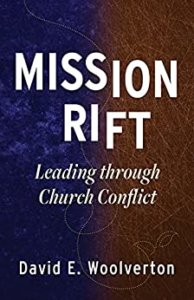David Woolverton says there are two types of church conflict — conflict that destroys teams, ministries, and congregational vibrancy and conflict that cultivates growth by driving toward a transformative end. The key variable is a leader who sees their leadership role as not merely resolving the conflict but rather developing healthier ways for the congregation to carry out its mission.
Every congregation I have served over 30 years has had to navigate through conflict as we sought to “make disciples who make disciples.” Learning to welcome the unchurched, dropping established programs, developing new leaders, realigning ministries toward our mission, letting go of staff members who didn’t want to change, putting limits on sabotaging behaviors, giving away our Christmas Eve offering to meet the needs of our unchurched neighbors — all brought about conflict, sometimes seismic in scope.
At the risk of sounding reductionist, after more than 30 years as a pastor and 15 of those as a church and clergy consultant, I’ve come to the conclusion that there are two types of conflict in congregations: conflict that kills and conflict that cultivates growth.
Conflict that kills
Conflict that kills — that damages or destroys teams, ministries, missions, vibrancy — occurs when we as the people of God forget who we are, why we’re here, and where we’re going in carrying out the divine mission. Yes, people disagree, even in the church. Indeed, whenever “two or three are gathered” in Jesus’s name, it seems like there’s bound to be a fight. Yet when we begin to focus more on ourselves — our needs, our preferences — and less on the wants, needs, and preferences of our sisters and brothers in faith, not to mention those we are trying to reach with the gospel, the ensuing conflicts can be deadly for a congregation. We start to “bite and devour one another,” the way the apostle Paul describes the church in Galatia (Gal. 5:15). Over time, these chronic conditions push out leaders who have the capacity to reset the congregation’s values and redirect its mission. Many of these leaders leave disillusioned, exhausted, and reluctant to engage in further ministry. In the subsequent leadership vacuum, church “bullies” gain control of the flock of God, as they hijack the emotional safety of the congregation and run the church like mob bosses, protecting their sacred turf.
Conflict that cultivates growth
Conflict that cultivates growth — in teams, ministries, missions, vibrancy — often looks similar to conflict that kills, because it begins with the same scenarios. The difference, however, is found in how leaders function. They ask different questions. They focus less on the content of the individual conflict scenarios and more on the context — why that conflict is present. They focus on creating a healthier, proactive culture that includes mutual accountability, best practices for outreach and mission, appropriate relational boundaries. Conflict is seen less as something to be resolved or mediated because it makes people anxious and more as a context for learning how to live together as a people called to transform their neighborhoods, schools, and workplaces.
Pastors and other leaders can help faithful followers of Jesus understand conflict as an opportunity to remember who they are in Christ, why they’re here, and where they’re going on their mission. Successfully leading through conflict toward a transformative end will always bear exponential dividends, empowering a congregation’s witness within its community and beyond.
I’m less inclined to resolve conflict too quickly lest we inadvertently sabotage the potential such conflict has to draw the congregation toward appropriate spiritual growth. In fact, paradoxically, I have often found that a lack of conflict may be a symptom of missional decline rather than congregational unity.
Conflict leadership
When conflict arises, it’s not our job as pastors and leaders to fix conflict. The notion of fixing conflict implies that, first, a specific conflict can be fixed; second, the people involved in the conflict want to be fixed; and third, it’s important to resolve the conflict in order to carry out the mission. In reality, we try to fix the things that cause us anxiety, and conflict raises our anxiety. We are afraid that we will lose relationships, status, respect, power, rights, privileges, and control. Conflict and its ramifications can make us anxious. When our anxiety goes up, we will do whatever it takes to reduce it.
Our job is not to resolve conflict. Our job is to develop healthier ways for our congregations to carry out our divine mission of making disciples of Jesus Christ and showing our neighbors that love can, in fact, transform the world. (John 13:35; 17:25-26). Conflicts actually are contexts within which that equipping and discipling can take place.
We need to change the way we view conflict in the church. Instead of looking at the conflict’s content, we must turn our eyes to the conflict’s context. What are the unhealthy relational systems that are breeding grounds for dysfunction (e.g., closed power groups or bullies)? In what ways has this congregation been neglecting its mission mandate and consuming itself (Gal 5:15)? What is this conflict revealing about the congregation’s lack of disciple leaders? What are the patterns of repeated conflict telling you about unresolved grief or unrepented sin?
If we resolve conflict too quickly, we may sabotage the very opportunity it presents to realign the congregation to the mission God intended for it within its community. Our task is not to fix conflict; our task is to lead through it.
 This material is excerpted from Mission Rift: Leading Through Church Conflict (Fortress Press, 2021) by David E. Woolverton. Used by permission of Fortress Press (fortresspress.com). The book is available at Fortress Press, Cokesbury, and Amazon.
This material is excerpted from Mission Rift: Leading Through Church Conflict (Fortress Press, 2021) by David E. Woolverton. Used by permission of Fortress Press (fortresspress.com). The book is available at Fortress Press, Cokesbury, and Amazon.
Related Resources
- 5 Suggestions for Managing Conflict in Polarized Contexts by David R. Brubaker
- 9 Ways Leaders Can Respond to Conflict Constructively by Peter L. Steinke
- More Than a Nonanxious Presence by Patricia Farris







